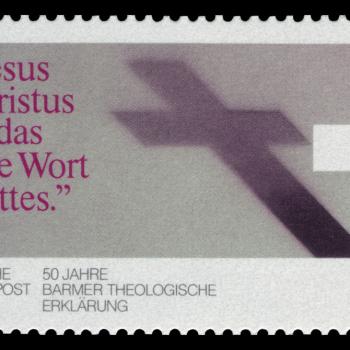Why I Gave Up on Writing a Critical Survey of the History of Christian Ethics


A publisher wanted me to write a critical survey of the history of Christian ethics—something like I wrote about the history of Christian theology (The Story of Christian Theology) and about the history of modern theology (The Journey of Modern Theology). I agreed to do it and immersed myself in reading secondary and primary sources—going back to the 2nd century.
I wrote and wrote and wrote, making it up to about 250 pages of manuscript. Then I became depressed—about the project. I take Christian ethics with ultimate seriousness. I can sometimes sort of laugh at the errors Christians made in developing doctrines, sad as those errors were and are.
However, when I looked back at my research and writing to discover why I was tempted to give up on the project, I realized the reason. There was general agreement about Christian ethics up to the time of Emperor Constantine and then it all fell apart. Yes, there were still great Christian voices in Christian ethics after Constantine (e.g., John Chrysostom), but my heart was sickened by the so-called Christian ethics of Augustine and others of the early age of Christendom and afterwards. Yes, again, there were points of light here and there (especially the Anabaptists during and after the Reformation), but throughout so much of Christendom, up to and including some of the most influential Christian ethicists in the 20th century, the deviations from the teachings of Jesus, the accommodations to secular (sometimes pretending to be Christian) political and economic powers, overwhelmed me with grief. It became a story I didn’t want to dwell on or tell.
*Sidebar: The opinions expressed here are my own (or those of the guest writer); I do not speak for any other person, group or organization; nor do I imply that the opinions expressed here reflect those of any other person, group or organization unless I say so specifically. Before commenting read the entire post and the “Note to commenters” at its end.*
For me, anyway, Constantinianism (entanglements of church and state) and Augustinianism (justifications of violence against heretics) took true, Jesus-centered, New Testament ethics off the rails and far away from the pre-Constantinian emphases on humility, peace, love of enemies, rejection of entanglements with political power and luxurious wealth, etc.
But something else that depressed me was (and is) the extreme diversity of opinions about Christian ethics among non-cultic, orthodox Christian thinkers. One can find justifications of almost anything among them—including Luther’s command to the nobility of the German nation to slaughter the rebelling peasants and Calvin’s defense of the burning of Serventus. But those are only two examples. Both were strongly criticized by other Christian thinkers and leaders. Then, of course, was the great “Christian” debate over slavery with many Christians defending the “peculiar institutions”—as it was called in the American South.
And I found extremely troubling pieces of ethical advice by leading Christian theologians, reformers, bishops, church leaders, etc.
To make a long story shorter, I found that after Constantine Christian ethics became, to borrow a phrase from philosopher William James, a “blooming, buzzing confusion.” Nothing held it all together; there was and is in it nothing like orthodoxy in doctrine. Leading Christian ethicists went all over the place in total chaotic, seemingly anarchic theories and arguments about right and wrong, good and bad. The center fell apart—beginning with Constantine.
Don’t get me wrong; I’m not arguing that the pre-Constantinian church fathers and mothers agreed about everything. But there were common themes, “threads” of ethical thought that went unchallenged by orthodox Christian leaders and thinkers. The main one that jumped out at me was humility—not in the modern sense of acting humble (one thinks for example of Charles Dickens’s character Uriah Heep in David Copperfield) but in the sense of considering others greater than oneself. The whole idea of exalting Christians to heights of glory was anathema to them. Especially, exalting oneself to heights of glory over others. But also, going to war was against the earliest Christians’ common ethical failures. Christians who served in the Roman Legions and killed someone were commonly required to do penance for up to a year before being restored to communion.
By the time I had finished my research and written about half the book I was convinced that Christian ethics is a mess that cannot be cleared up by anyone. Of course, I have my own opinions about Christian ethics and have shared many of those here. I think I’m right and those who disagree with me are wrong. But what I cannot find in Christian ethics after Constantine is any consensus about Christian ethics. I find leading Christian thinkers and influencers such as Adolf von Harnack writing the German emperor’s public address defending Germany’s imperialism in World War 1 appalling. Karl Barth challenged it as did Christoph Blumhardt. But they were lonely voices crying in the wilderness. As my colleague Philip Jenkins has demonstrated in his book The Great and Holy War, the majority of Christians on all sides considered World War 1 a holy war.
I find the condition of Christian ethics absolutely appalling and sickening. It lacks any center, anything like doctrinal orthodoxy. Highly respected, allegedly devout Christian ethicists disagree radically with each other over questions such as war, capital punishment, poverty, abortion, biomedical ethics, and just about everything where there should be some kind of at least rough consensus.
My conclusion was and is that Christian ethics fell apart with Constantine and Augustine and never recovered its center or its balance. The research into it made me heart sick.
I should also mention, as I did to the publisher, that health issues also stopped my writing, as they have hindered my work on this blog. But here I want to say to you, my faithful readers (and others), that what we need is some semblance of a center of Christian ethics such as that, to choose one example, celebrating the killing of even one terrorist is ethically and morally wrong—for Christians. The one I have in mind was not even given a chance to surrender (he probably wouldn’t have, but that is beside the point) and some members of his household were also killed. Killing human beings is wrong unless it is necessary. And even if it is necessary, it is sin and calls for repentance and forgiveness. Let’s start there and go from there. But I despair even of that. After Constantine and Augustine I find no consensus about that among Christian leaders, thinkers, influencers.
Now, finally, I anticipate that someone will ask that I provide the title of one good book of Christian ethics. The one I used, with real satisfaction and success, in my annual ethics seminar was Kingdom Ethics by Glen Stassen and David Gushee (InterVarsity Press). It is now out of print. (David Gushee wrote a new version of the book after Stassen died; in my opinion it is not as good as the original.) You can buy copies of it via used book resellers online (e.g., abebooks.com). In Kingdom Ethics the authors insist on dragging Christian ethics back to the Sermon on the Mount, cutting through all the layers of “Christian” casuistry that accumulated throughout the centuries. I must mention one other excellent book of Christian ethics: The Upside Down Kingdom by Donald Kraybill (Herald Press). Kraybill does not cover all the territory covered by Stassen and Gushee in Kingdom Ethics, but he lays down the basic principles of Christian ethics including especially Jesus’s preferential treatment of the weak, the vulnerable, the poor, the outsiders, the excluded, the rejected–the other side of the “coin” of real humility.
*Note to commenters: This blog is not a discussion board; please respond with a question or comment only to me. If you do not share my evangelical Christian perspective (very broadly defined), feel free to ask a question for clarification, but know that this is not a space for debating incommensurate perspectives/worldviews. In any case, know that there is no guarantee that your question or comment will be posted by the moderator or answered by the writer. If you hope for your question or comment to appear here and be answered or responded to, make sure it is civil, respectful, and “on topic.” Do not comment if you have not read the entire post and do not misrepresent what it says. Keep any comment (including questions) to minimal length; do not post essays, sermons or testimonies here. Do not post links to internet sites here. This is a space for expressions of the blogger’s (or guest writers’) opinions and constructive dialogue among evangelical Christians (very broadly defined).












